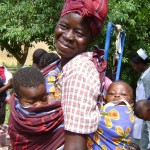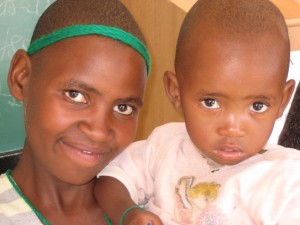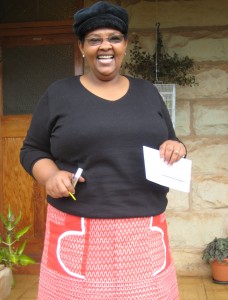New IYCN materials
New IYCN materials
Kenya: Infant feeding and HIV trainer’s guide and participant’s manual
Kenya: Infant Feeding and HIV Reporting Tools
Haiti: Stakeholder’s Workshop Report in French
Helpful links and publications
Bread for the World’s blog: Breaking the Cycle of Diarrhea and Malnutrition
A Roadmap for
US Leadership to End Global Hunger
News from our colleagues
New PATH report:
Diarrheal Disease: Solutions to Defeat a Global Killer
Welcome to the second issue of the IYCN Update, a newsletter from USAID’s Infant & Young Child Nutrition (IYCN) Project. Distributed four times per year, each issue offers updates on the latest research, new resources, and project news.
Research highlights
Can current food aid commodity formulations meet energy needs for kids?
A study published in May 2009 in the International Journal of Food Sciences and Nutrition found that it is difficult to meet the energy requirements of infants and young children with complementary foods made from current food aid commodity formulations. The authors call for new formulations and specifications in order to enable food programs to improve infant and young child nutrition. Read more.
Does early breastfeeding cessation for mothers with low CD4 counts increase infant mortality?
In an article published in April 2009 in the International Journal of Epidemiology, investigators in Zambia confirmed that both CD4 count and early breastfeeding cessation were associated with increased infant mortality. However, only a small percentage of the association between low CD4 count and high mortality could be attributed to early breastfeeding cessation. Read more.
Flexible administration of Sprinkles for anemia control improves adherence and impact
In a trial published in the European Journal of Clinical Nutrition in February 2009, researchers in Bangladesh gave mothers 60 sachets of Sprinkles to use daily for either two months, three months, or four months to reduce anemia. Those given four months to consume the 60 sachets showed the best adherence and improvement in hemoglobin status. The authors concluded that giving mothers the ability to decide when to use Sprinkles motivated them to improve adherence and resulted in better outcomes. Read more.
Benefits of daily nutritional supplements for children in Malawi
In January 2009, the American Journal of Clinical Nutrition published a study in which three groups of Malawian children received different daily nutritional supplements from 6 to 18 months of age—a maize-soy flour that required cooking, and either 50 grams or 25 grams of a peanut-based, ready-to-eat food. While after two years of follow-up those receiving the higher dose of ready-to-eat food were least likely to be severely stunted, the cost of that intervention would be prohibitive for most families. Read more.
Point of view
Meeting the challenge of growth faltering
In a new commentary on the IYCN website, The Manoff Group’s Marcia Griffiths discusses how the global nutrition community can improve feeding for children from 6 to 23 months of age. Lessons from successful global programs show that we must go beyond the offer of nutrient-dense foods and focus on approaches that help caregivers find an appropriate balance among many critical feeding practices as they nourish their children during the critical first two years of life.
Country spotlight: Lesotho
Tsepo’s story
At the Litsoeneng Health Centre, a small clinic in a remote area of Lesotho, Adelina, 40, a nurse, and Mabeata, 62, a community health worker in the nearby village of Khopolo, proudly tell the story of Tsepo. He’s a healthy, 17-month-old boy who is learning how to walk and loves playing with other children. Mabeata and Adelina meet monthly to monitor his growth and make sure that he stays healthy.
But this wasn’t always the case for Tsepo. When he was 8 months old, Mabeata visited his home to monitor his growth and discovered that he wasn’t gaining weight at a normal rate. Immediately, she encouraged his mother, Malehloa, only 16 years old, to take him to the clinic to correct the problem. After participating in a training workshop conducted by the IYCN Project, the community health worker knew that it was critical to send babies with growth problems to the clinic as soon as possible. She even walked with Malehloa and Tsepo from Khopolo to visit the clinic.
“I was very concerned about Tsepo. I wanted to be there to help Malehloa understand the problem and coordinate with the nurses to follow up after the visit,” Mabeata explained.
Message from the field: Lesotho
Pretesting in Pitseng
By Makatleho Masoabi, IYCN Country Coordinator
In April, I worked with the Ministry of Health and Social Welfare to pretest Lesotho’s new infant and young child feeding training curriculum for health workers. More than 20 trainers from health facilities in all ten districts of the country joined us for a training workshop in the mountains of Pitseng—about a two-hour drive from the capital city of Maseru.
We asked the trainers—mostly nurses, one doctor, and a few national stakeholders—to take turns facilitating counseling role plays, demonstrating good breastfeeding techniques, and leading other activities. During each session of this week-long course, participants gave feedback to help us make future training workshops appropriate for health workers in their districts.
Project news
Announcing new activities in Nigeria
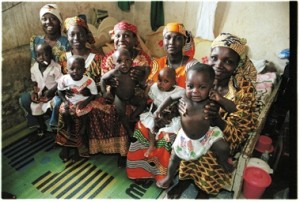
Mothers with their babies at a clinic in Nigeria. (Use of this image does not indicate or imply HIV status.)
IYCN recently received funding from the US President’s Emergency Plan for AIDS Relief (PEPFAR) to launch activities in Nigeria, where there is a pressing need to improve infant and young child nutrition within the context of HIV. The project plans to support the government’s efforts to reduce the high burden of maternal and child undernutrition and improve HIV-free survival.
The IYCN team will provide technical assistance to the Ministry of Health and state and local government partners to update nutrition policies, train health care workers, and enhance behavior change programs targeting HIV-positive mothers and HIV-affected children. The project expects to open an office in Abuja, the capital city, and start up activities later in the summer.
Join us at IAS 2009
IYCN will participate in the 5th International AIDS Society (IAS) Conference on HIV Pathogenesis, Treatment and Prevention in Cape Town, South Africa from July 19 to 22, 2009. PATH’s Margaret Waithaka, who works with the IYCN Project in Kenya, will participate in Infant Feeding and HIV: Science and Practice, a satellite session to be hosted by the Elizabeth Glaser Pediatric AIDS Foundation on July 19, 2009.
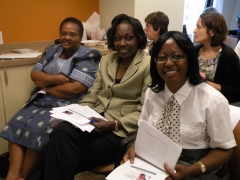
IYCN Country Coordinators prepared for a brown bag in Washington, DC on May 21. From left to right: Makatleho Masoabi, Lesotho; Hortense Angoran-Benié, Côte d'Ivoire; and Catherine Mukuka, Zambia.
Conferences
Here’s a rundown of IYCN’s participation in conferences and events over the past few months. Check the IYCN website for more information, selected PowerPoint presentations, and links.
• IYCN team members participated in Project Concern International’s Africa Forum 2009, focusing on HIV/AIDS and nutrition and food security, in Mangochi, Malawi from June 21 to 26, 2009. Hortense Angoran-Benié facilitated a skills-building session on infant feeding counseling for HIV-positive mothers, and Makatleho Masoabi presented IYCN’s multi-sectoral approach to improving infant feeding in Lesotho. Read more.
• Dr. Tom Schaetzel, IYCN’s Technical Director, talked about effective actions for preventing malnutrition among children younger than two years of age as a panelist in Bread for the World’s Getting Nutrition on the Development Agenda in Washington, DC on June 15, 2009.
• IYCN moderated two nutrition panels at the Global Health Council’s 36th Annual International Conference in Washington, DC, from May 26 to 29, 2009. The panels highlighted the importance of interventions that focus on prevention and the need to prioritize improved complementary feeding in order to reduce malnutrition among children. Read more.
Also at the conference, PATH’s Dr. Kiersten Israel-Ballard presented new research on feeding HIV-exposed infants in Kenya. This assessment is informing IYCN’s activities in the country. Read more.
• IYCN Country Coordinators from Zambia, Côte d’Ivoire, and Lesotho shared challenges, good practices, and lessons learned from IYCN activities in their respective countries at a brown bag event in Washington, DC on May 21, 2009. Read more.
• On May 11, 2009, more than 85 individuals working toward integrated programming for maternal, infant, and young child nutrition joined a satellite session, organized by IYCN, the Global Alliance for Improved Nutrition, and the University of California, Davis, at the Second International Meeting of the Micronutrient Forum in Beijing, China. Participants discussed solutions and successful approaches to integrate interventions to improve nutrition during the critical period from prior to conception through the first two years of life. Read more.
We welcome your feedback and suggestions for our next issue. Please contact: info@iycn.org.
Photos: Aurelio Ayala III, Kali Erickson, Christine Demmelmaier, David and Lucile Packard Foundation, Ashley Hughes
Date: Jul 6, 2009 | Category: Newsletters

